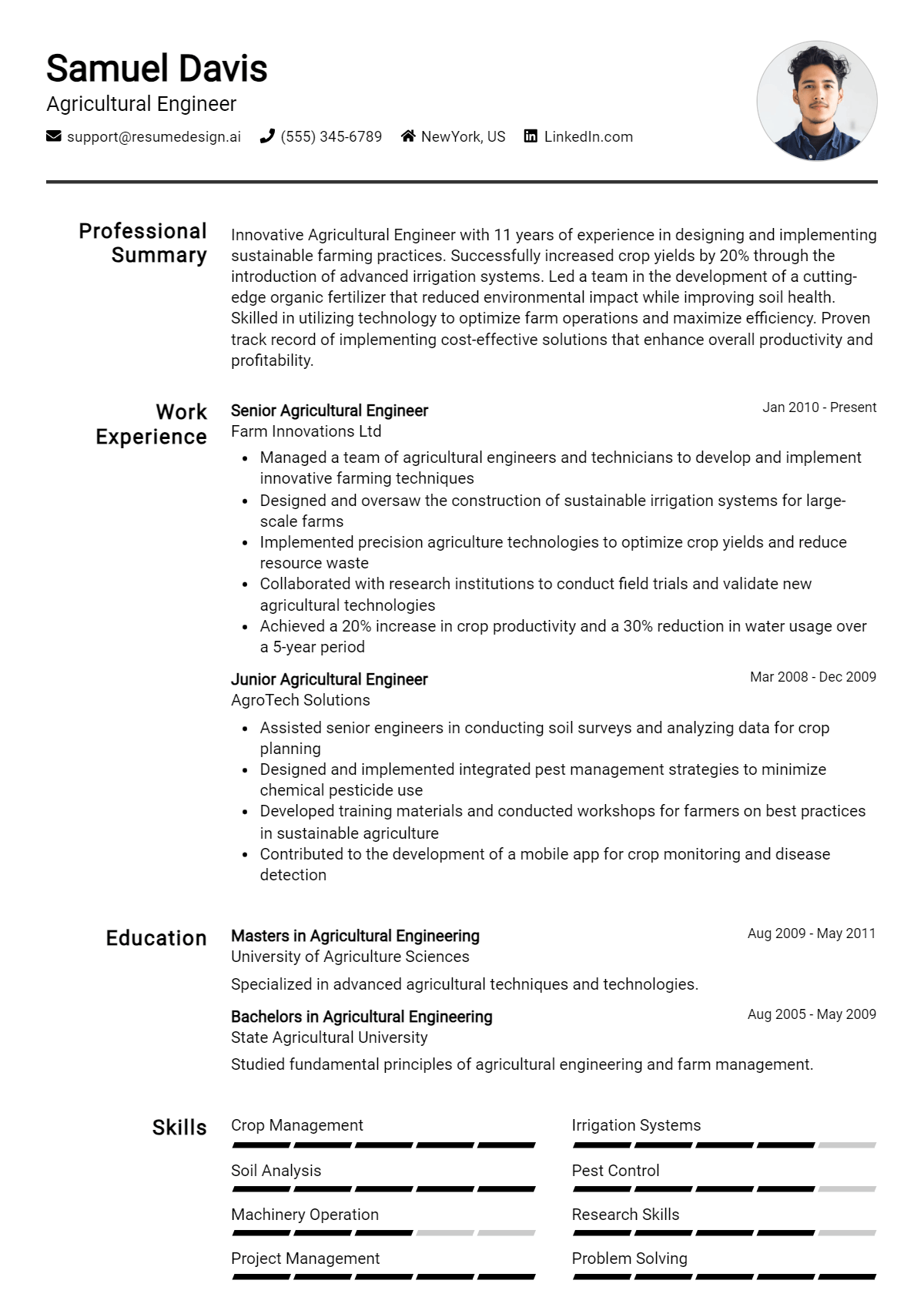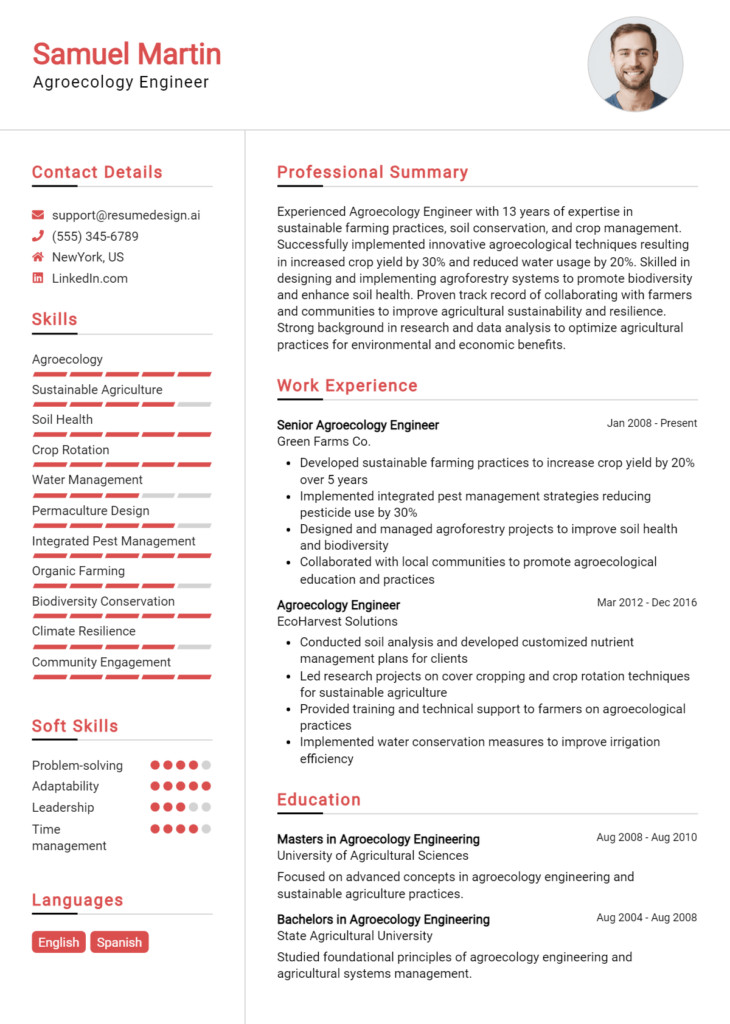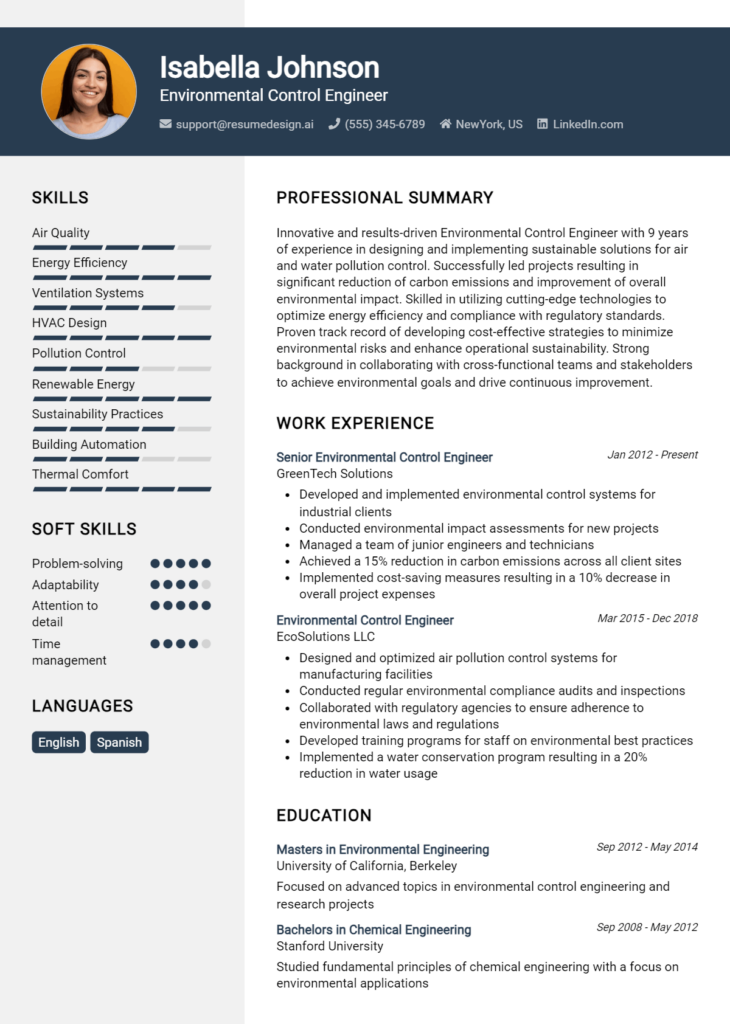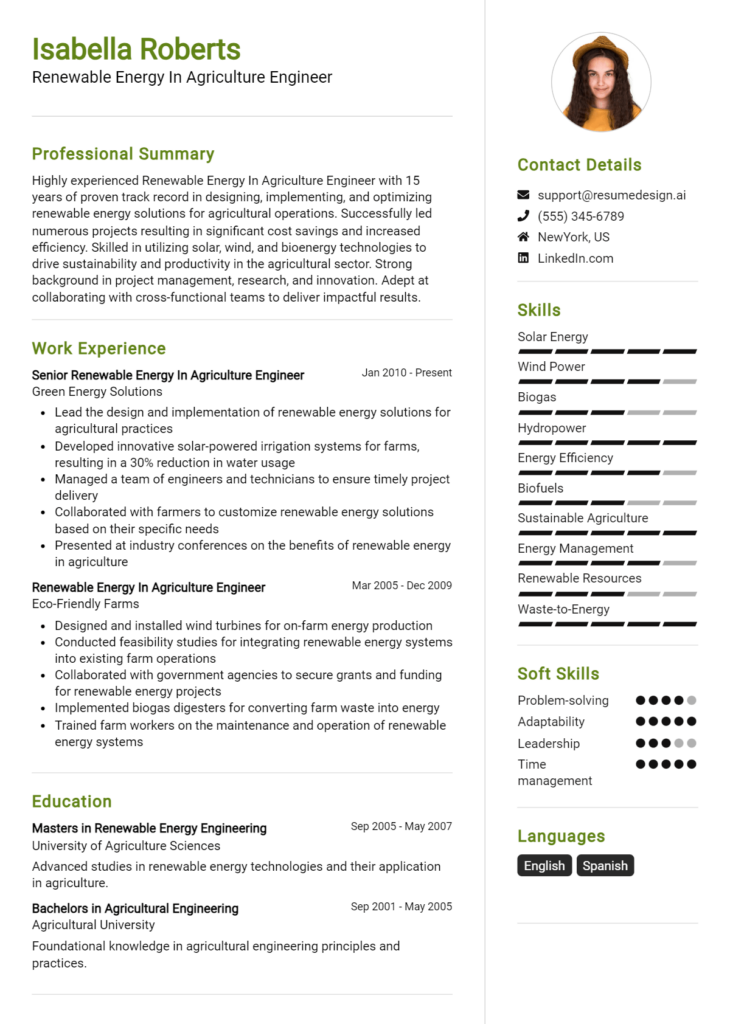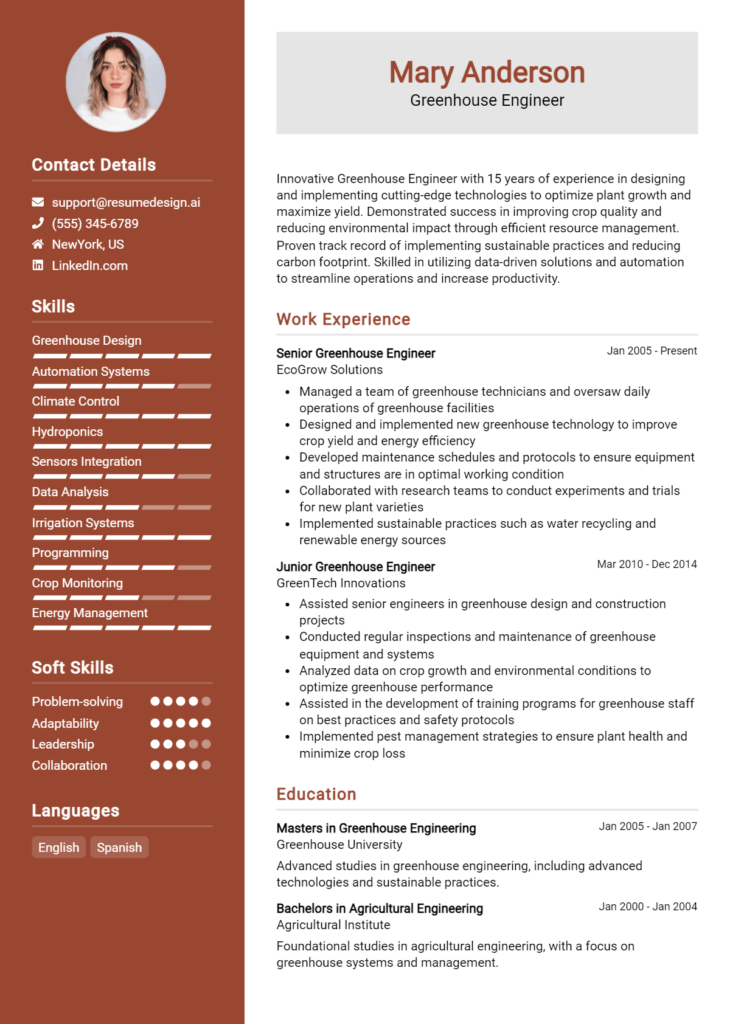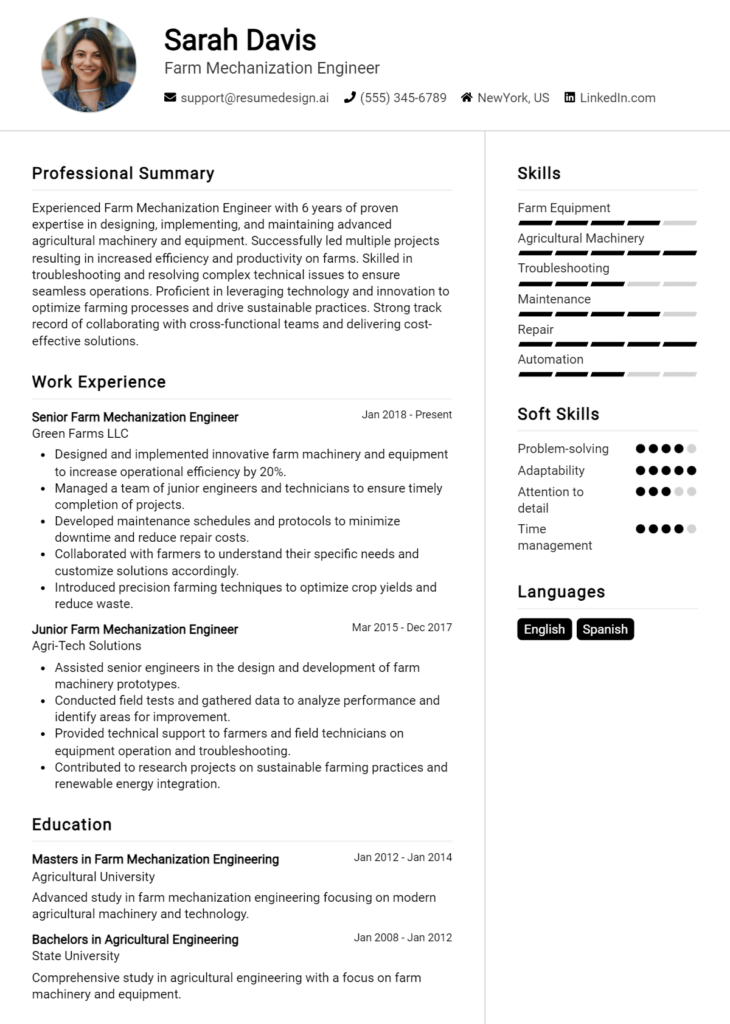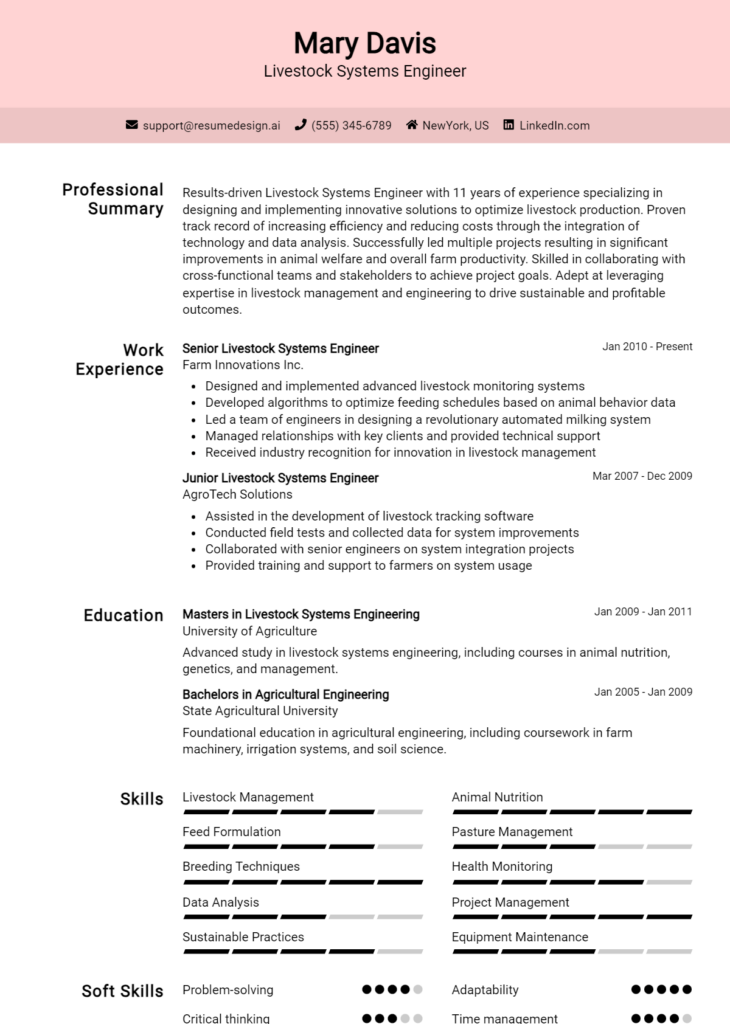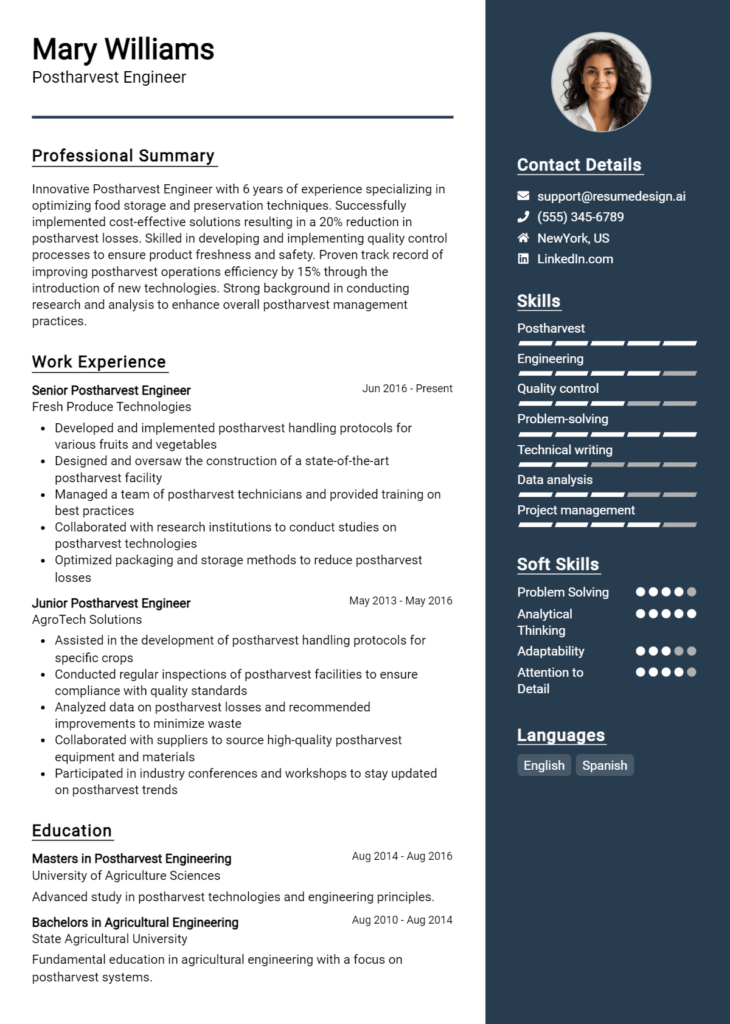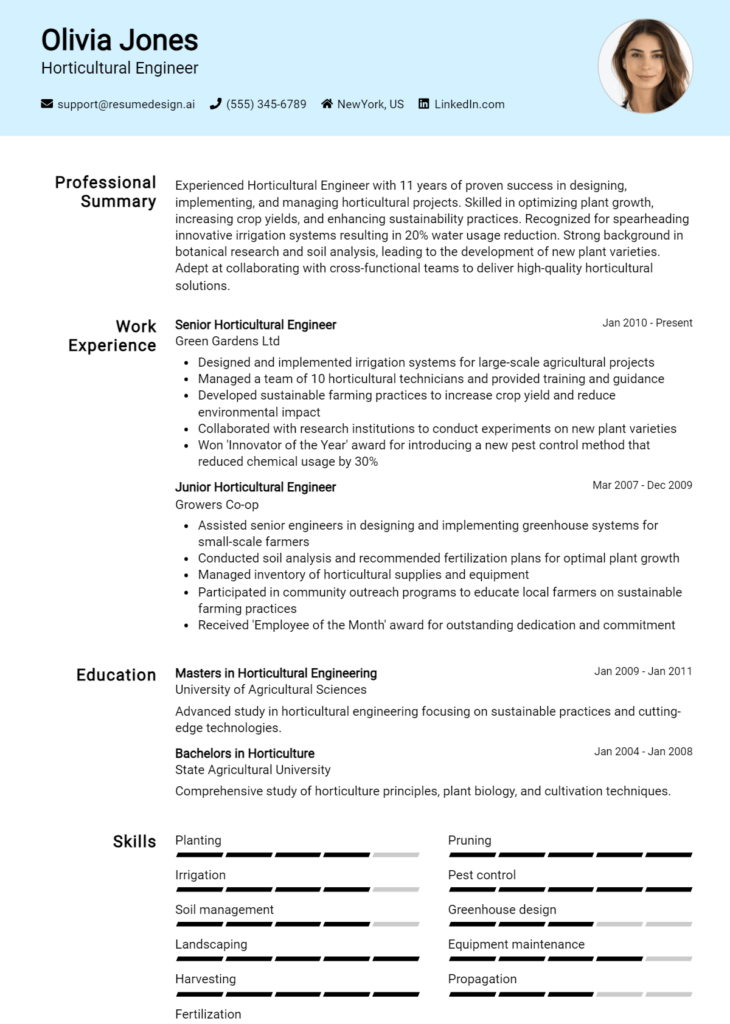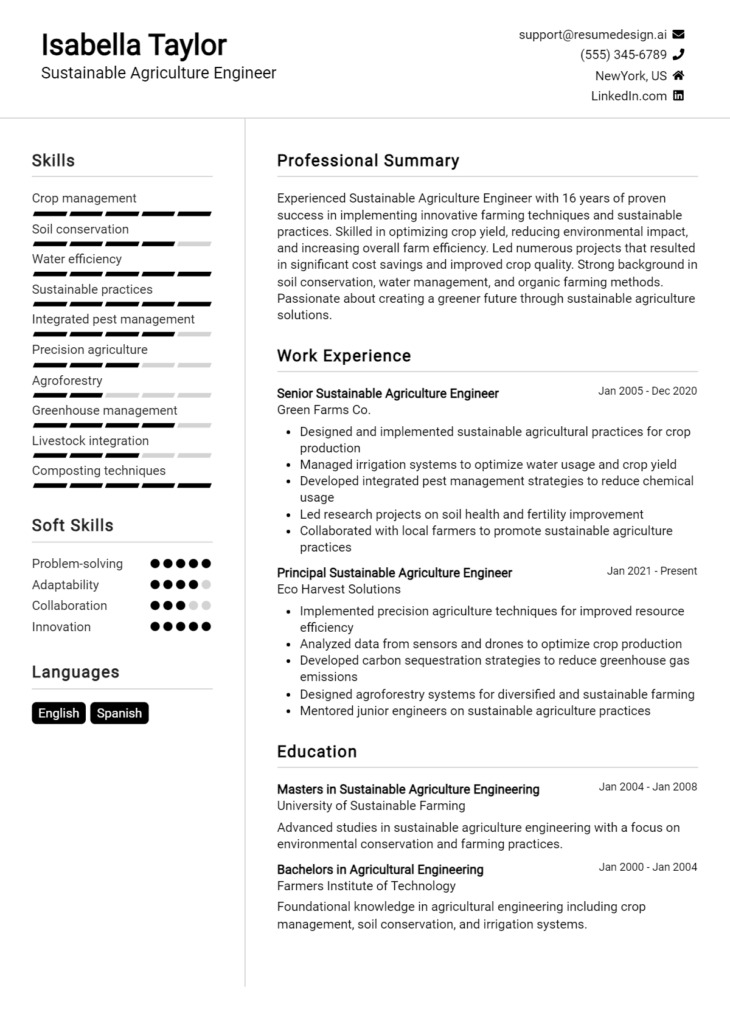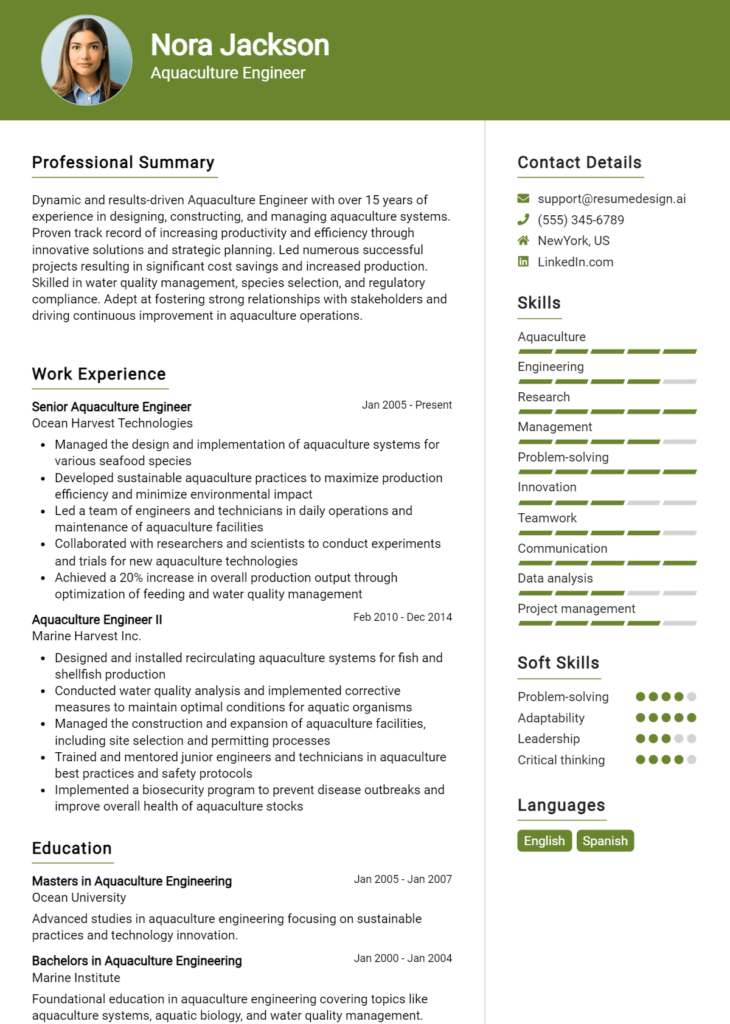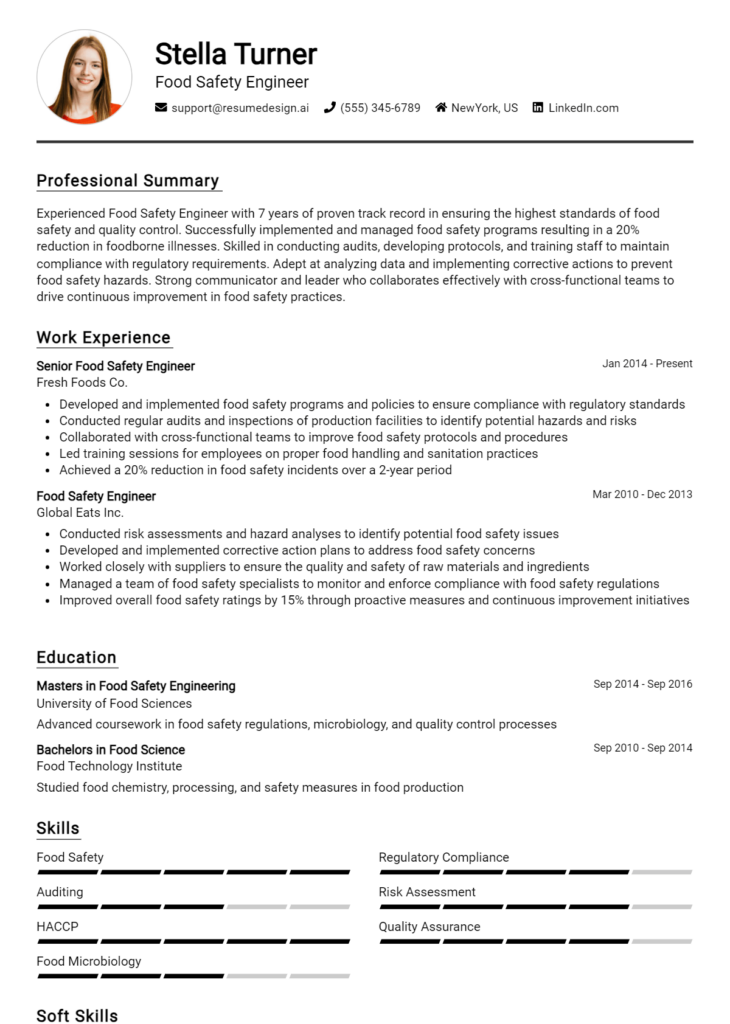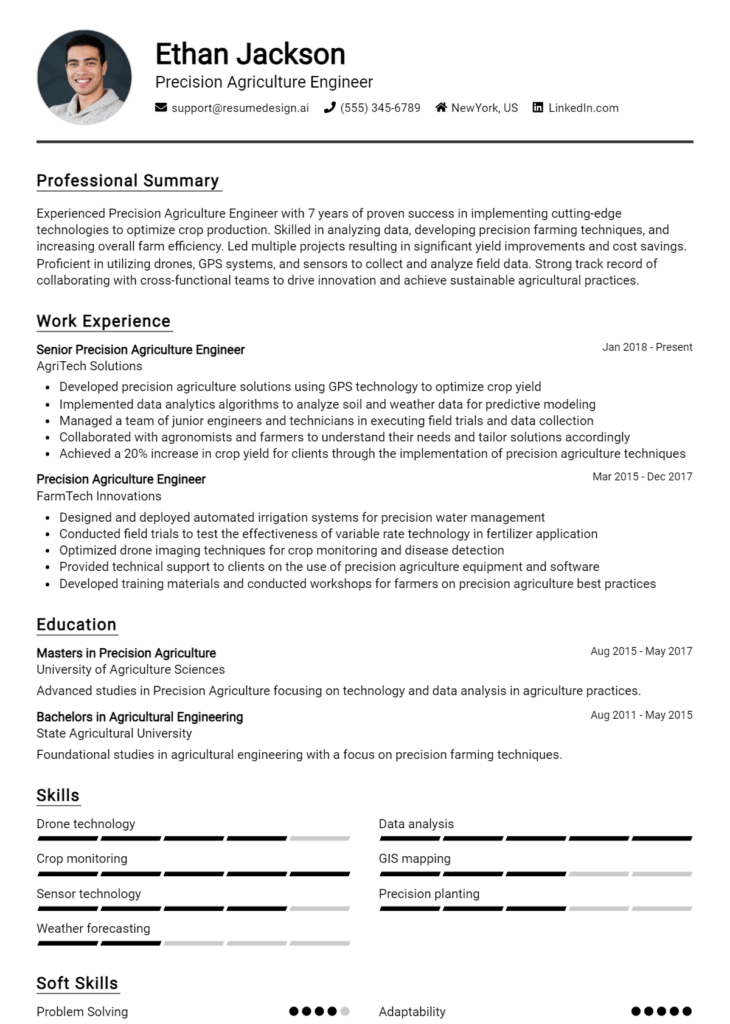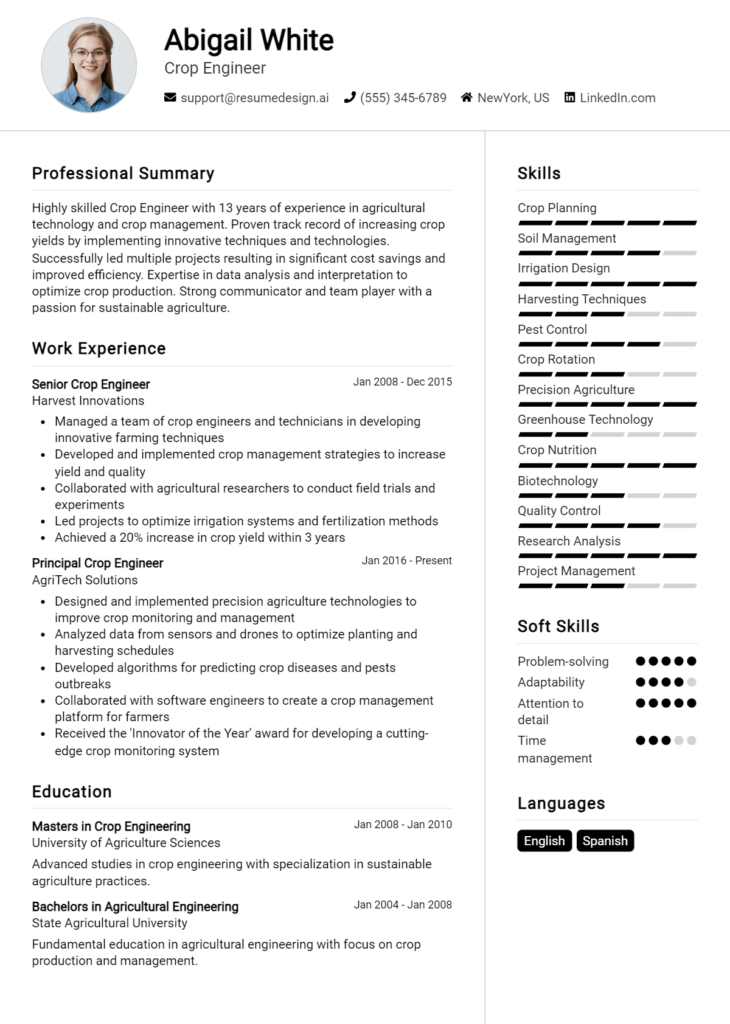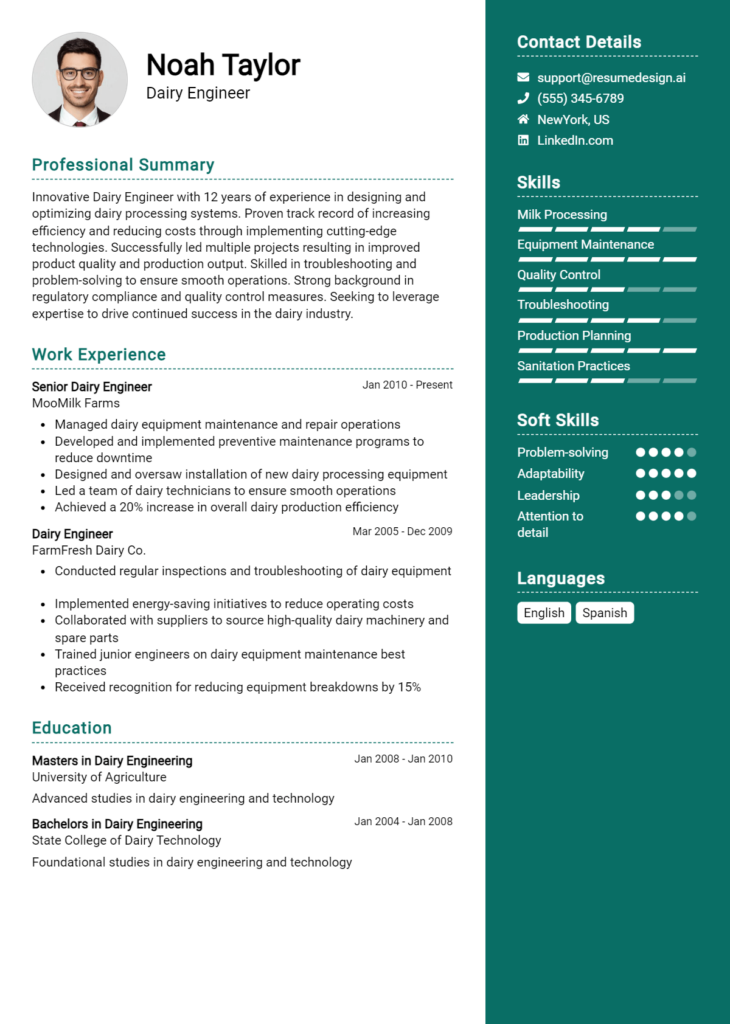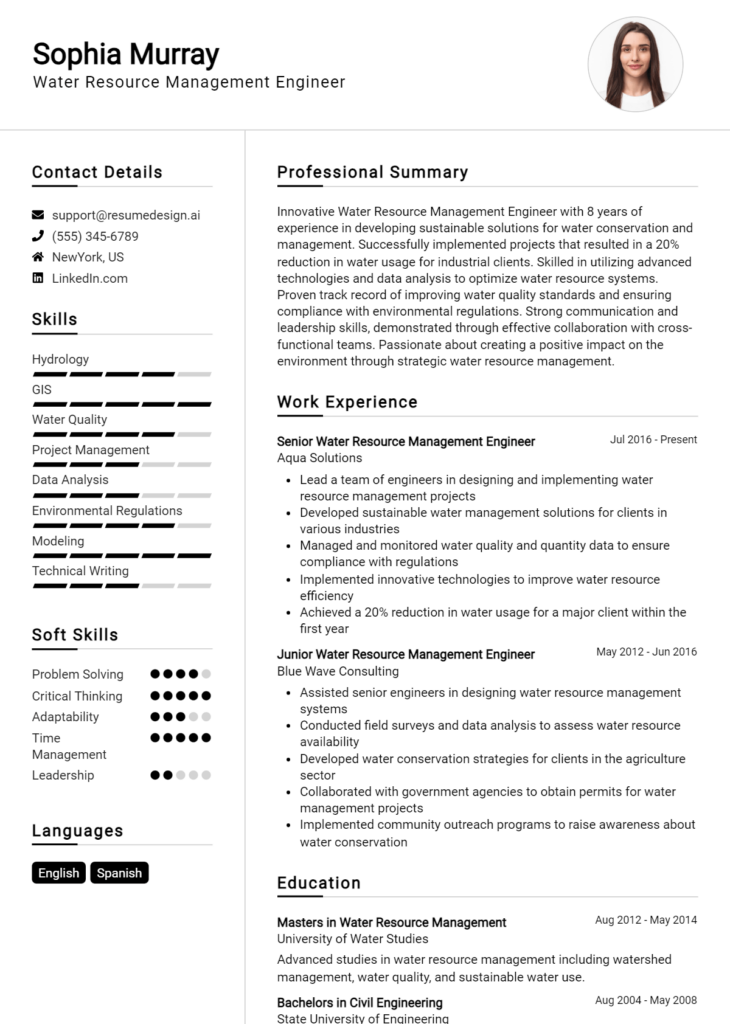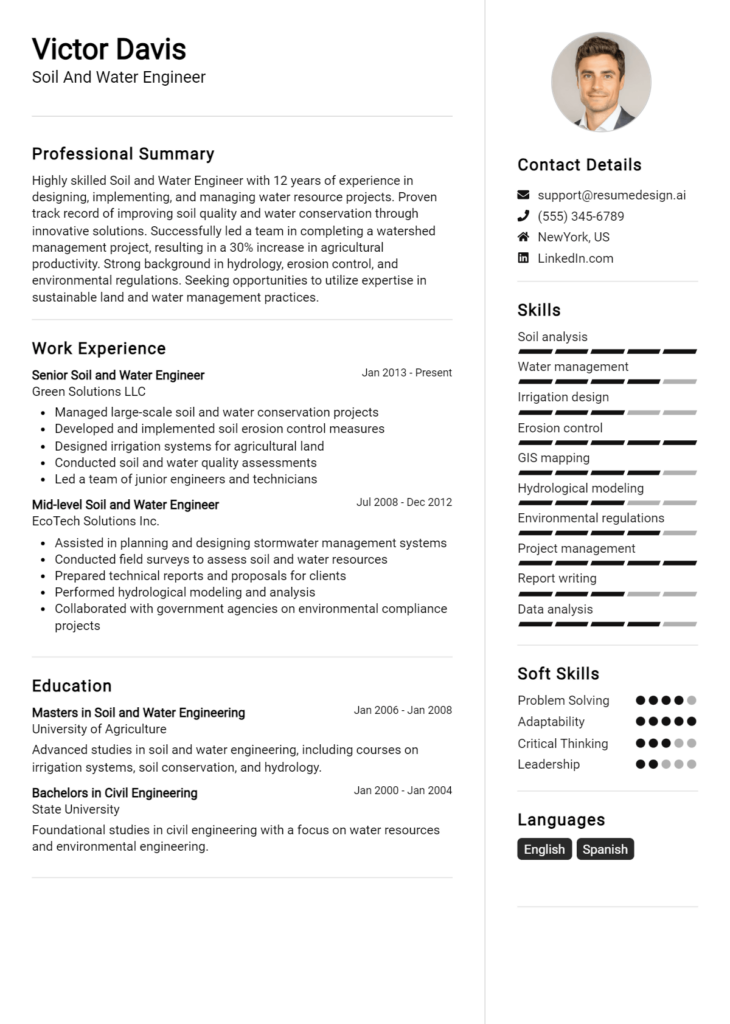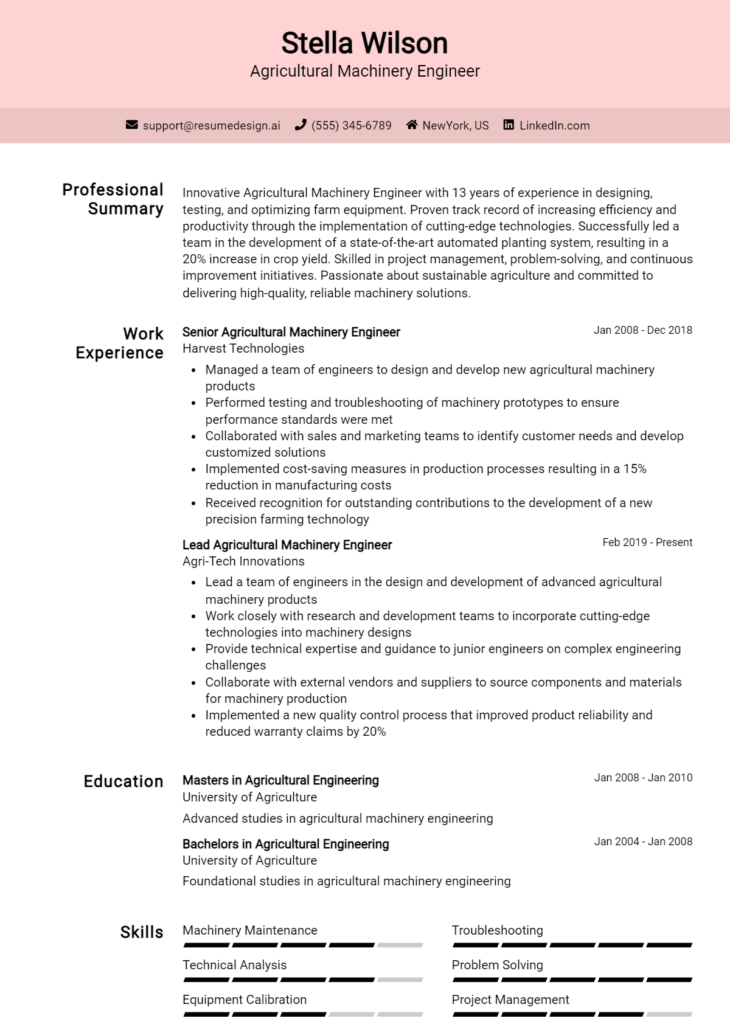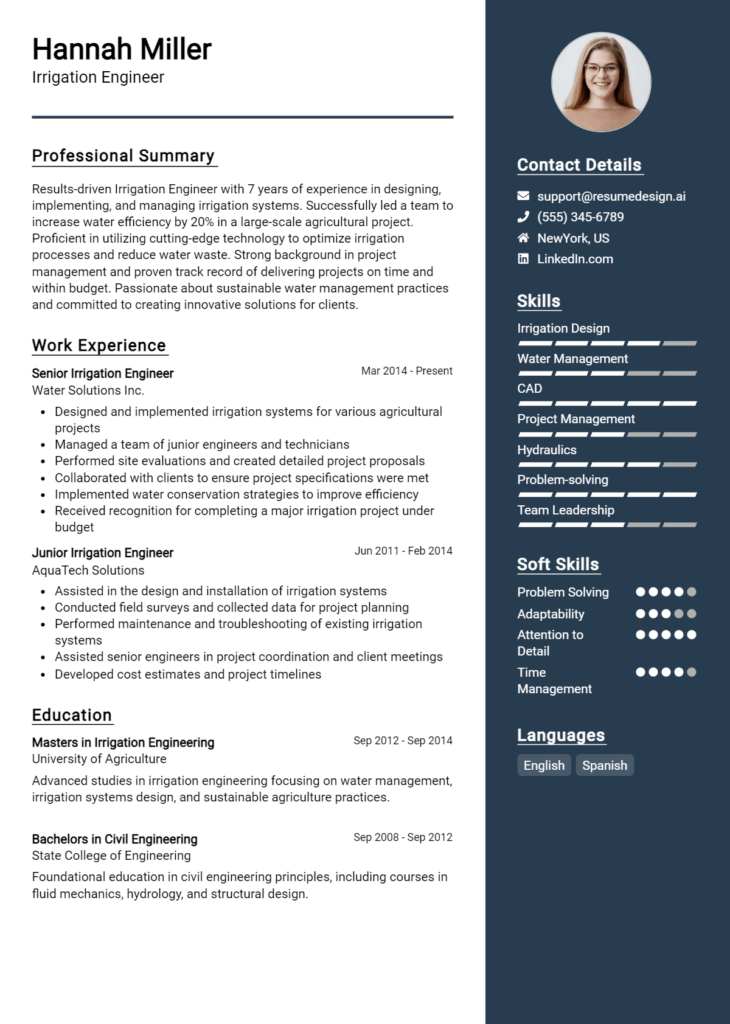Agricultural Engineer Core Responsibilities
Agricultural Engineers play a crucial role in enhancing agricultural productivity through the integration of engineering principles with agricultural sciences. They design and implement efficient systems for crop production, irrigation, and soil management, requiring strong technical, operational, and problem-solving skills. This role often collaborates with various departments, ensuring that projects align with organizational goals. A well-structured resume highlighting these qualifications can effectively demonstrate an engineer's ability to contribute to innovative solutions and sustainability in agriculture.
Common Responsibilities Listed on Agricultural Engineer Resume
- Design and develop agricultural machinery and equipment.
- Analyze environmental impacts and develop sustainable practices.
- Conduct research to improve crop yield and quality.
- Implement irrigation systems and water management strategies.
- Evaluate soil conditions and recommend amendments.
- Collaborate with agronomists and other specialists on projects.
- Ensure compliance with safety and environmental regulations.
- Provide technical support and training to farmers and staff.
- Manage agricultural projects from conception to completion.
- Utilize computer-aided design (CAD) software for project modeling.
- Monitor and assess the performance of agricultural systems.
High-Level Resume Tips for Agricultural Engineer Professionals
In the competitive field of agricultural engineering, a well-crafted resume serves as a vital tool for professionals seeking to make a lasting impression on potential employers. Often the first point of contact, your resume must effectively reflect your unique blend of skills, experiences, and accomplishments. This initial snapshot not only showcases your qualifications but also communicates your passion for the industry. As such, it is essential to create a document that stands out in a crowded job market. This guide will provide practical and actionable resume tips specifically tailored for agricultural engineer professionals, helping you to present yourself as the ideal candidate.
Top Resume Tips for Agricultural Engineer Professionals
- Tailor your resume to the job description by using relevant keywords and phrases that align with the specific role you are applying for.
- Showcase your relevant experience by including specific projects or roles that demonstrate your expertise in agricultural systems, machinery, or environmental practices.
- Quantify your achievements with measurable results, such as "increased crop yield by 20%" or "reduced irrigation costs by 15%," to illustrate your impact.
- Highlight industry-specific skills, such as proficiency in CAD software, knowledge of sustainable farming practices, or expertise in soil science.
- Include certifications and licenses relevant to agricultural engineering, such as Professional Engineer (PE) designation or certifications in precision agriculture.
- Utilize a clean and professional layout that enhances readability, ensuring that key information is easy to locate.
- Incorporate a strong summary statement at the beginning of your resume that encapsulates your experience, skills, and career goals.
- Keep your resume concise, ideally one page, while ensuring it covers all necessary information without overwhelming the reader.
- Proofread your resume multiple times to eliminate any errors or inconsistencies that could detract from your professionalism.
By implementing these tips, agricultural engineer professionals can significantly increase their chances of landing a job in their field. A well-structured and tailored resume not only highlights your qualifications but also demonstrates your commitment to the role and the industry, making you a more appealing candidate to prospective employers.
Why Resume Headlines & Titles are Important for Agricultural Engineer
In the competitive field of agricultural engineering, a well-crafted resume headline or title plays a pivotal role in capturing the attention of hiring managers. A strong headline immediately summarizes a candidate's key qualifications and professional identity in a concise and impactful manner. It serves as the first impression, providing a snapshot of the candidate's expertise and aligning it with the job they are applying for. An effective headline should be relevant, succinct, and tailored to the specific role, ensuring that it resonates with the expectations of potential employers.
Best Practices for Crafting Resume Headlines for Agricultural Engineer
- Keep it concise: Aim for one to two sentences that clearly convey your professional identity.
- Be role-specific: Tailor your headline to reflect the specific agricultural engineering position you are targeting.
- Highlight key qualifications: Incorporate your most relevant skills, experience, and accomplishments.
- Use industry-specific terminology: Utilize language and keywords that are commonly recognized in the agricultural engineering field.
- Avoid jargon: Ensure the headline is easily understandable to a broader audience, including HR personnel.
- Showcase unique value: Emphasize what sets you apart from other candidates, such as specialized skills or significant achievements.
- Consider the company's needs: Reflect on how your qualifications align with the goals and challenges of the hiring organization.
- Revise and refine: Continuously assess and update your headline to ensure it remains relevant and impactful.
Example Resume Headlines for Agricultural Engineer
Strong Resume Headlines
Innovative Agricultural Engineer with 10+ Years of Experience in Sustainable Farming Solutions
Expert in Precision Agriculture: Maximizing Crop Yield Through Advanced Technologies
Results-Driven Agricultural Engineer Specializing in Soil Conservation and Water Management
Weak Resume Headlines
Agricultural Engineer Seeking Job
Engineer with Experience in Agriculture
The strong headlines are effective because they clearly articulate the candidate's expertise, years of experience, and specific areas of specialization, making it easy for hiring managers to quickly assess their qualifications. In contrast, the weak headlines fail to impress due to their vagueness and lack of specific information, leaving hiring managers with little to no insight into the candidate's capabilities or unique value proposition. A memorable and relevant headline can significantly enhance a resume's impact and increase the chances of advancing in the hiring process.
Writing an Exceptional Agricultural Engineer Resume Summary
A resume summary is a crucial component for an Agricultural Engineer, serving as the first impression for hiring managers. It provides a snapshot of your professional identity, highlighting your key skills, relevant experience, and notable accomplishments in the field. A well-crafted resume summary can quickly capture attention and set you apart from other candidates by showcasing your qualifications tailored to the specific job you're applying for. It should be concise, impactful, and focused on the unique contributions you can bring to the role, making it an essential tool in your job application arsenal.
Best Practices for Writing a Agricultural Engineer Resume Summary
- Quantify Achievements: Use numbers and metrics to demonstrate the impact of your work.
- Focus on Relevant Skills: Highlight the technical and soft skills that are most pertinent to the job.
- Tailor the Summary: Customize your resume summary for each application based on the job description.
- Keep it Concise: Aim for 2-4 sentences that convey your qualifications without excessive detail.
- Use Action Words: Start sentences with strong action verbs to convey a sense of initiative and accomplishment.
- Highlight Industry Knowledge: Showcase your understanding of agricultural systems, technologies, and practices.
- Include Certifications: Mention any relevant certifications or licenses that enhance your qualifications.
- Showcase Problem-Solving Abilities: Emphasize your experience in overcoming challenges in agricultural engineering projects.
Example Agricultural Engineer Resume Summaries
Strong Resume Summaries
Dynamic Agricultural Engineer with over 7 years of experience optimizing irrigation systems, resulting in a 30% increase in crop yield for regional farms. Proven track record in implementing sustainable practices and reducing water consumption by 25% through innovative design solutions.
Results-driven Agricultural Engineer skilled in precision agriculture technologies, with a Master's degree in Agricultural Engineering. Successfully managed a team on a $1.5 million project that improved soil health and reduced pesticide use by 40%, enhancing overall farm profitability.
Dedicated Agricultural Engineer with expertise in soil conservation and sustainable farming techniques. Increased operational efficiency by 20% through the introduction of new machinery and methods, while also leading educational workshops for farmers on best practices.
Weak Resume Summaries
Agricultural Engineer with some experience in the field looking for a new job opportunity. Good at problem-solving and working with farmers.
I am an Agricultural Engineer who has worked in various projects and has some knowledge of agricultural practices. Seeking to use my skills in a new role.
The strong resume summaries are considered effective because they include specific accomplishments and metrics that demonstrate the candidate's impact in previous roles, showcasing their skills and expertise relevant to agricultural engineering. In contrast, the weak summaries lack detail and quantifiable results, making them too generic and leaving hiring managers with little insight into the candidate's capabilities or achievements.
Work Experience Section for Agricultural Engineer Resume
The work experience section of an Agricultural Engineer resume is critical as it provides a comprehensive overview of the candidate's practical skills and accomplishments in the field. This section not only highlights the technical expertise needed to tackle complex agricultural challenges but also showcases the candidate's ability to manage teams effectively and deliver high-quality products. By quantifying achievements and aligning their experience with industry standards, candidates can demonstrate their value to potential employers, making this section a vital component of a successful resume.
Best Practices for Agricultural Engineer Work Experience
- Focus on specific technical skills relevant to agricultural engineering, such as irrigation design, soil analysis, or crop management.
- Quantify achievements with metrics, such as percentage increases in yield or reductions in resource consumption.
- Highlight leadership roles in projects to showcase management and team collaboration abilities.
- Use industry-specific language and terminology to align with job descriptions and demonstrate familiarity with the field.
- Include diverse experiences, such as internships, co-ops, or volunteer work, to illustrate a well-rounded background.
- Tailor each entry to the job you are applying for, emphasizing the most relevant experiences and skills.
- Describe challenges faced and how you overcame them to demonstrate problem-solving skills.
- Utilize action verbs to convey a sense of initiative and impact in your previous roles.
Example Work Experiences for Agricultural Engineer
Strong Experiences
- Led a team of 5 engineers in developing a new automated irrigation system, resulting in a 30% reduction in water usage and a 15% increase in crop yield over two growing seasons.
- Designed and implemented soil health monitoring protocols for a 1,000-acre farm, improving fertilizer efficiency by 25% and reducing costs by $12,000 annually.
- Collaborated with cross-functional teams to develop sustainable farming practices that decreased pesticide use by 40%, enhancing environmental compliance and farm profitability.
- Conducted research on precision agriculture technologies, presenting findings at a national conference, which led to a partnership with a tech startup for software development.
Weak Experiences
- Worked on various engineering projects related to agriculture.
- Assisted in the maintenance of farming equipment and systems.
- Helped with data collection for agricultural studies without specific outcomes mentioned.
- Participated in team meetings and contributed ideas.
The strong experiences listed above are considered effective because they provide concrete examples of achievements, leadership roles, and collaboration that resulted in measurable outcomes. They demonstrate not only technical skills but also the ability to drive significant improvements in agricultural practices. Conversely, the weak experiences lack specificity and quantifiable results, making it difficult for potential employers to gauge the candidate's true impact and capabilities in previous roles.
Education and Certifications Section for Agricultural Engineer Resume
The education and certifications section of an Agricultural Engineer resume is crucial for showcasing the candidate's academic background, industry-relevant credentials, and commitment to continuous learning. This section not only highlights the formal education necessary for the role but also emphasizes specialized training and certifications that validate the candidate's expertise. By providing relevant coursework and certifications, candidates can significantly boost their credibility and demonstrate their alignment with the specific requirements of the job, setting them apart from other applicants.
Best Practices for Agricultural Engineer Education and Certifications
- Include degrees from accredited institutions related to agricultural engineering or related fields.
- List industry-recognized certifications, such as Professional Engineer (PE) or Certified Agricultural Engineer (CAE).
- Highlight relevant coursework that directly pertains to agricultural practices, technology, and engineering principles.
- Detail any specialized training programs or workshops attended that are pertinent to current agricultural technologies.
- Use a chronological format to present education and certifications, starting with the most recent.
- Be concise but thorough, ensuring that the information is easy to read and understand.
- Tailor the education and certifications section to match the job description closely.
- Consider including ongoing educational pursuits, such as online courses or seminars, to demonstrate a commitment to staying current in the field.
Example Education and Certifications for Agricultural Engineer
Strong Examples
- B.S. in Agricultural Engineering, University of California, Davis, 2021
- Certified Agricultural Engineer (CAE), American Society of Agricultural and Biological Engineers, 2022
- Relevant Coursework: Soil and Water Conservation, Precision Agriculture, Agricultural Machinery Design
- Professional Engineer (PE) License, State of California, 2023
Weak Examples
- B.A. in History, University of Texas, 2010
- Certification in Basic Computer Skills, 2015
- Relevant Coursework: Introduction to Psychology, 2018
- Professional Development Workshop on Time Management, 2019
The strong examples are considered robust as they reflect relevant academic qualifications and accepted industry certifications that align with the expectations for an Agricultural Engineer. They demonstrate a solid foundation in agricultural engineering principles, specialized knowledge, and professional recognition. In contrast, the weak examples highlight qualifications that are either unrelated or outdated, failing to showcase the necessary skills and knowledge required for the role. This distinction is critical for hiring managers who seek candidates with specific expertise in agricultural engineering.
Top Skills & Keywords for Agricultural Engineer Resume
In the highly specialized field of agricultural engineering, having a well-crafted resume that highlights relevant skills is crucial for standing out in a competitive job market. Skills not only showcase an applicant's capabilities but also demonstrate their potential contributions to agricultural innovations and sustainability. Employers look for a balanced mix of both hard and soft skills to ensure candidates can effectively tackle the complex challenges faced in this industry. By carefully selecting and articulating these skills, candidates can enhance their resumes and increase their chances of securing interviews.
Top Hard & Soft Skills for Agricultural Engineer
Soft Skills
- Problem-solving
- Communication
- Teamwork
- Adaptability
- Critical thinking
- Leadership
- Time management
- Creativity
- Attention to detail
- Project management
- Conflict resolution
- Interpersonal skills
- Analytical thinking
- Decision-making
- Active listening
- Initiative
Hard Skills
- Proficient in CAD software
- Knowledge of hydraulic systems
- Expertise in soil science
- Familiarity with agricultural machinery
- Understanding of irrigation systems
- Experience with GIS technology
- Proficiency in data analysis and modeling
- Knowledge of environmental regulations
- Ability to conduct field trials
- Experience in crop management
- Familiarity with renewable energy systems
- Proficient in programming languages (e.g., Python, MATLAB)
- Knowledge of pest management strategies
- Ability to design agricultural structures
- Familiarity with precision agriculture techniques
- Expertise in sustainable farming practices
- Knowledge of agricultural economics
- Experience with soil and water conservation techniques
For a comprehensive guide on how to effectively incorporate these skills into your resume, as well as tips on showcasing your work experience, be sure to explore additional resources.
Stand Out with a Winning Agricultural Engineer Cover Letter
Dear [Hiring Manager's Name],
I am writing to express my interest in the Agricultural Engineer position at [Company Name] as advertised on [where you found the job listing]. With a Bachelor's degree in Agricultural Engineering from [Your University] and over [X years] of hands-on experience in designing and implementing innovative agricultural systems, I am excited about the opportunity to contribute to your team. My background in sustainable agriculture and precision farming aligns perfectly with [Company Name]'s commitment to advancing agricultural practices through technology and innovation.
Throughout my career, I have successfully managed multiple projects that enhanced crop yield and resource efficiency. At [Previous Company Name], I led a team in the development of a state-of-the-art irrigation system that reduced water usage by 30%, while increasing overall productivity by 15%. My ability to analyze soil and crop data, combined with my knowledge of agricultural machinery and technology, has enabled me to create effective solutions tailored to specific agricultural challenges. I am particularly drawn to this role at [Company Name] because of your dedication to sustainable farming practices and your reputation for pioneering research in agricultural technology.
In addition to my technical skills, I pride myself on my strong communication and collaboration abilities. I have worked closely with farmers, agronomists, and environmental scientists to implement best practices that promote both economic viability and environmental stewardship. I am eager to bring this collaborative spirit to [Company Name] and to contribute to projects that not only meet the needs of farmers but also address the pressing challenges of climate change and food security.
Thank you for considering my application. I am excited about the opportunity to discuss how my expertise in agricultural engineering can benefit [Company Name]. I look forward to the possibility of contributing to your innovative projects and am available for an interview at your earliest convenience.
Sincerely,
[Your Name]
[Your Phone Number]
[Your Email Address]
Common Mistakes to Avoid in a Agricultural Engineer Resume
When crafting a resume for an Agricultural Engineer position, it's crucial to present your skills and experiences effectively to stand out in a competitive job market. However, many candidates make common mistakes that can undermine their chances of securing an interview. By avoiding these pitfalls, you can create a strong, professional resume that showcases your qualifications and aligns with the expectations of employers in the agricultural engineering field.
Ignoring Industry Keywords: Failing to include relevant keywords from the job description can result in your resume being overlooked by applicant tracking systems (ATS) and hiring managers.
Using a Generic Resume: Sending out the same resume for every application can be detrimental. Tailor your resume to highlight the skills and experiences that are most relevant to each specific job.
Overloading with Technical Jargon: While technical proficiency is important, using excessive jargon can make your resume difficult to read. Strive for a balance between demonstrating expertise and maintaining clarity.
Neglecting Soft Skills: Agricultural engineering requires collaboration and communication. Omitting soft skills such as teamwork, problem-solving, and adaptability can make your resume less appealing to employers.
Lack of Quantifiable Achievements: Simply listing job responsibilities without quantifying your achievements can weaken your resume. Use numbers and metrics to illustrate your impact in previous roles.
Using an Unprofessional Email Address: An unprofessional email can create a negative first impression. Choose a simple and professional email address that includes your name.
Failing to Proofread: Spelling and grammatical errors can undermine your professionalism. Always proofread your resume multiple times and consider having someone else review it as well.
Ignoring the Importance of Formatting: A cluttered or overly complex resume layout can be off-putting. Use clear headings, bullet points, and consistent formatting to enhance readability and professionalism.
Conclusion
As we conclude our exploration of the Agricultural Engineer role, it's essential to highlight the key aspects that define this profession. Agricultural Engineers play a critical role in enhancing agricultural productivity through innovative design and technology. They work on various projects, including the development of sustainable farming practices, irrigation systems, and machinery that can withstand environmental challenges.
To excel in this field, having an effective resume is crucial. Your resume should not only showcase your technical skills but also emphasize your problem-solving abilities, project management experience, and knowledge of agricultural regulations. Tailoring your resume to reflect these qualities can significantly improve your chances of standing out to potential employers.
Now is the time to review your Agricultural Engineer resume. Ensure it accurately represents your qualifications and achievements. To assist you in this process, take advantage of the various tools available:
- Explore a range of resume templates that can help you format your information professionally.
- Utilize the resume builder for a user-friendly experience while creating your resume.
- Check out resume examples for inspiration on how to effectively present your skills and experiences.
- Don't forget to craft a compelling cover letter using our cover letter templates to make a strong first impression.
Take charge of your career today by refining your resume and equipping yourself with the right tools to secure your next opportunity in the agricultural engineering field!

